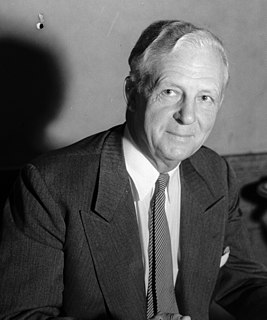A Quote by Bertrand Russell
I say quite deliberately that the Christian religion, as organized in its Churches, has been and still is the principal enemy of moral progress in the world.
Related Quotes
You find as you look around the world that every single bit of progress in humane feeling, every improvement in the criminal law, every step toward the diminution of war, every step toward better treatment of the colored races, or every mitigation of slavery, every moral progress that there has been in the world, has been consistently opposed by the organized churches of the world. I say quite deliberately that the christian religion, as organized in its churches, has been and still is the principle enemy of moral progress in the world.
Organized religion has too often followed the road of other people's institutions. It has made adjustments, compromises, and surrenders to a materialistic civilization for the benefit of material security in spite of occasional twinges of conscience and moral protests. The result has been that today much of organized religion is materialistically solvent but spiritually bankrupt.
One can say that the disaffection is still a lingering naiveté about, not the place of poetry in the world, but - how to say this - the moral and intellectual presence of poets in the world. And while this may seem an old conversation to many poets who roll their eyes and say, "Here we go again about the function of poetry," I think that conversation, about poetry as an engaged art in a world that is full of regression or still lacking in progress, is still really not well-developed. It's almost an avoided conversation.
I wouldn't say that religion has promoted the social progress of mankind. I say that it has been a detriment to the progress of civilization, and I would also say this: that the emancipation of the mind from religious superstition is as essential to the progress of civilization as is emancipation from physical slavery.
I want to be a more serious-minded Christian, more detached from this world, more ready for heaven than I have ever been in my whole life. I want an ear that is sharp to know the voice of the enemy, whether it comes from religion, politics, or philosophy ... I would rather stand and have everybody my enemy than to go along with the crowd to destruction. Do you feel that way?
God doesn't help. I think that's a knockdown argument. I think that it really shows that whatever moral knowledge we have and whatever moral progress we make in our knowledge or whatever progress we make in our moral knowledge is not coming really from religion. It's coming from the very hard work really of moral philosophy, of trying to ground our moral reasonings.
It is true that we have not deliberately or wholly abandoned the Christian element in our tradition, but does that element count with us as it once did? Is the moral tone of the nation - its politics, its business life, its literature, its theatre, its movies, its radio networks, its television stations - Christian?


































